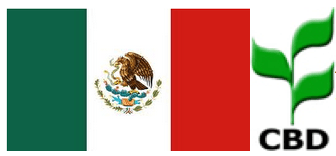 22 April 2016: Mexico intends to highlight the importance of biodiversity mainstreaming for the achievement of the Aichi Biodiversity Targets and the Sustainable Development Goals (SDGs) in its role as the host of the 13th meeting of the Conference of the Parties (COP 13) to the Convention on Biological Diversity (CBD), with the aim of facilitating the adoption of a ‘Cancun Declaration.’ Mexico has prepared a non-paper outlining possible elements of the declaration.
22 April 2016: Mexico intends to highlight the importance of biodiversity mainstreaming for the achievement of the Aichi Biodiversity Targets and the Sustainable Development Goals (SDGs) in its role as the host of the 13th meeting of the Conference of the Parties (COP 13) to the Convention on Biological Diversity (CBD), with the aim of facilitating the adoption of a ‘Cancun Declaration.’ Mexico has prepared a non-paper outlining possible elements of the declaration.
Mexico communicated its intention to highlight biodiversity mainstreaming during the High-level Segment (HLS) of COP 13 in an official notification to the Secretariat of the CBD. To facilitate the adoption of a declaration, it will host informal consultations with delegates at the first meeting of the CBD Subsidiary Body on Implementation.
The integration of biodiversity aims to maximize the contribution of biodiversity and ecosystem services to productive sectors while also reducing and mitigating the negative impacts of these sectors on biodiversity, according to the non-paper. It explains that the declaration will aim to convey strong political commitment on integrating conservation and the sustainable use of biodiversity, and it suggests that signatories commit to, inter alia: working together to integrate the conservation and sustainable use of biodiversity strategies, plans and national policies; strengthening legal frameworks and institutions and the role of national, sub-national and local governments; mobilizing domestic and international resources; collaborating across UN agencies, multilateral environmental agreements (MEAs) and other conventions; encouraging active participation of civil society, indigenous peoples and the private sector; and promoting the integration of biodiversity in public policies, legislation and institutions.
The non-paper also addresses four productive sectors: agricultural systems; forests; fisheries; and tourism. It underscores the role of agricultural systems and forests as reservoirs of biodiversity important to food security, nutrition and human health as well as ecosystem goods and services. The non-paper discusses an ecosystem approach to fisheries, inclusive of: restoration of over-exploited areas; the generation and use of knowledge and technological innovation for monitoring and management of sustainable fisheries; the need to reduce bycatch, discards and waste; and the need to support marine protected areas (MPAs). It describes sustainable tourism as a strategy for local and regional development, underscoring tourist services as catalysts for the adoption of sustainable consumption and production (SCP) practices.
The non-paper is currently available in Spanish, but will be made available in all UN languages. [CBD Notification (English, inclusive of Non-paper (Spanish)]
Issues
- Agriculture & Food Security,
- Protected Areas,
- International Negotiations,
- Biodiversity,
- National Action,
- Conservation,
- Ecosystem Approach,
- Global Biodiversity Strategy & Targets,
- SFM,
- Sustainable Use,
- Forests & REDD,
- Governance,
- Human Rights & Indigenous Peoples,
- Oceans & Coasts,
- Sustainable Consumption & Production,
- Sustainable Development,
- Tourism

